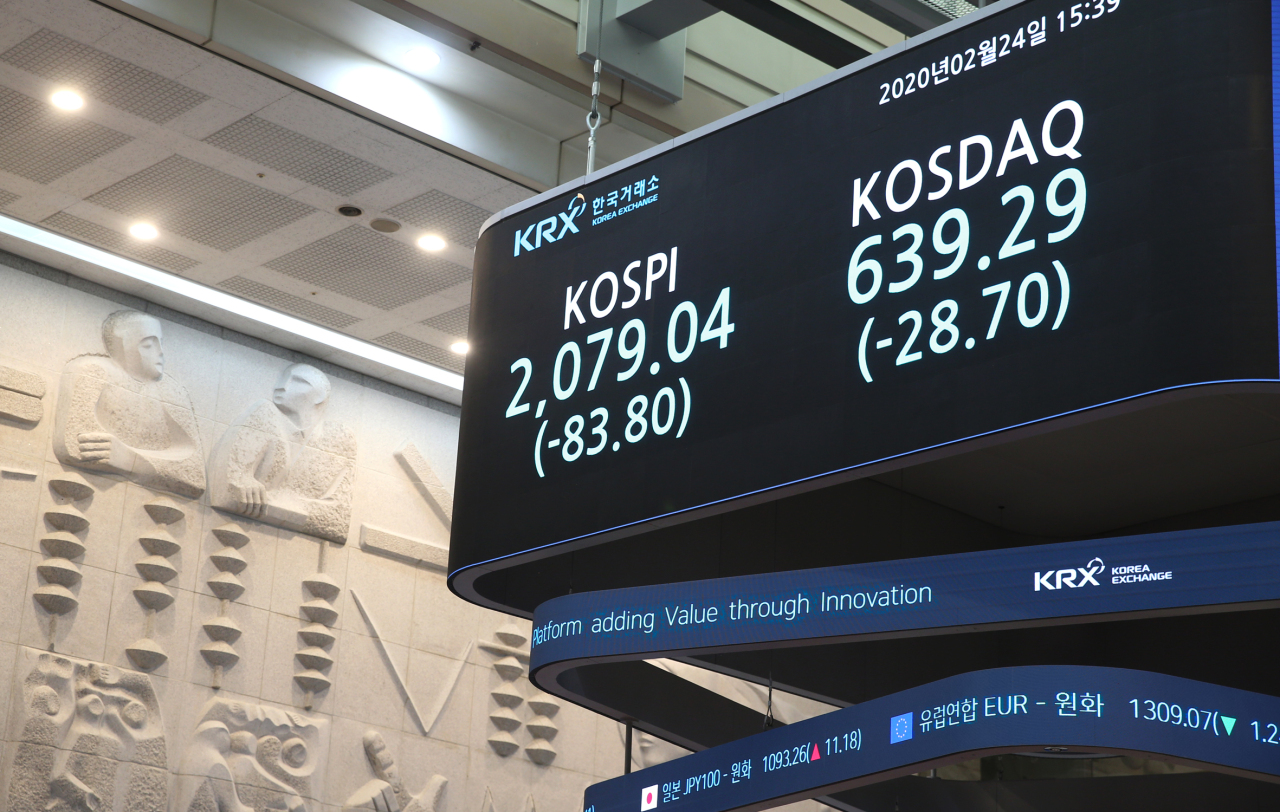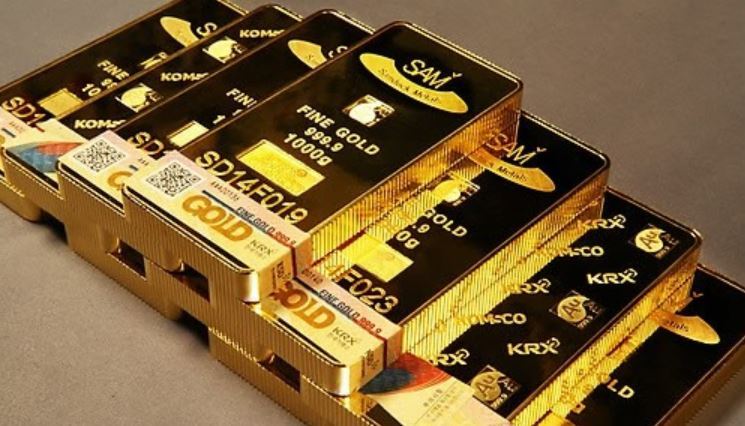Hit by COVID-19 fears, Seoul stocks plunge
Gold prices soar for sixth consecutive session as investors eye low-risk assets
By Jie Ye-eunPublished : Feb. 24, 2020 - 17:44

South Korean stocks plunged about 4 percent Monday, after the number of new coronavirus cases confirmed here nearly tripled over the weekend. The local currency closed at 1,220.2 won against the US dollar -- down 11 won from the previous session’s close -- marking the weakest won since Aug. 13 last year, when the trade spat between the US and China had escalated.
The benchmark Kospi opened sharply lower at 2,114.04 -- plummeting 48.8 points, or 2.26 percent, from the previous session. The weak start continued throughout the day to close at 2,079.04. The figure is the lowest since Dec. 5.
Foreign investors sold 786.8 billion won ($631.2 million) of stocks, weighing down the bourse. The tech-heavy Kosdaq also tumbled 28.7 points, or 4.3 percent, closing at 639.29. Institutional and individual investors dumped 22 billion won and 30.4 billion won, respectively.
The government on Sunday raised the alert level on the novel coronavirus to “serious,” the highest in its four-tier system, in response to the confirmation of hundreds of additional cases over the weekend. The country had reported 833 confirmed cases of the COVID-19 virus and eight related deaths as of 6 p.m. Monday.
Most large caps in the local market were in negative terrain. Market bellwether Samsung Electronics slid 4.05 percent to close at 56,800 won, while No. 2 chipmaker SK hynix lost 3.4 percent to 99,500 won.
The nation’s biggest carmaker Hyundai Motor dropped 4.3 percent and its smaller sister Kia Motors decreased 3.62 percent. Auto parts maker Hyundai Mobis shed 4.16 percent.
Pharmaceutical firms also lost ground. Samsung Biologics surrendered 5.24 percent and Celltrion decreased 4.52 percent. Hanmi Pharmaceutical shed 5.43 percent.
Other major indexes in Asia, such as the Shanghai composite and Hong Kong’s Hang Seng Index shed 0.28 percent and 1.64 percent, respectively, at the closing bell. Japan’s Nikkei 225 also dropped 0.39 percent, to close at 23,386.74.
Amid growing virus scares, major stock market indexes also followed losses on Wall Street on Friday. The Dow Jones Industrial Average declined 227.57 points, 0.78 percent, closing at 28,992.41. The Nasdaq retreated 1.79 percent and the S&P 500 slid 1.05 percent on the same day.
“The US’ purchasing mangers’ index for the manufacturing sector in February dropped below the 50 mark (for the first time) since 2015, which has raised concern over global economic slowdown,” said Seo Sang-young, an analyst at Kiwoom Securities. “As the number of COVID-19 infected patients surged rapidly, it further weighed down investor sentiments.”
While investors both at home and abroad turned away from the equity market, they are increasingly turning to low-risk assets. The price of gold also soared due to stronger investor appetite.

According to the Korea Exchange Gold Market, the price of gold closed at 64,800 won per gram -- up 3.09 percent from the previous closing price. The price has recorded the highest level since launching the nation’s gold trading platform in March 2014.
The price on gold rose for the sixth consecutive session, dating to Feb. 17. It began at 64,700 won per gram, up 2.9 percent, while marking a new high for a third consecutive session since the 61,500 won observed at Thursday’s close.
The total amount of trading marked 165.061 kilograms and some 10.68 billion won.
“As the number of novel coronavirus infections surged in Korea and Japan, it has fueled fears that the virus issue has turned into a pandemic. (The rise of the) gold price shows that investors prefer low-risk assets. Gold prices and the won-dollar exchange rates are forecast to have a high correlation for a while,” said Park Sang-hyun, an analyst at Hi Investment & Securities.
By Jie Ye-eun (yeeun@heraldcorp.com)









![[Kim Seong-kon] Democracy and the future of South Korea](http://res.heraldm.com/phpwas/restmb_idxmake.php?idx=644&simg=/content/image/2024/04/16/20240416050802_0.jpg&u=)








![[KH Explains] Hyundai's full hybrid edge to pay off amid slow transition to pure EVs](http://res.heraldm.com/phpwas/restmb_idxmake.php?idx=652&simg=/content/image/2024/04/18/20240418050645_0.jpg&u=20240418181020)

![[Today’s K-pop] Zico drops snippet of collaboration with Jennie](http://res.heraldm.com/phpwas/restmb_idxmake.php?idx=642&simg=/content/image/2024/04/18/20240418050702_0.jpg&u=)